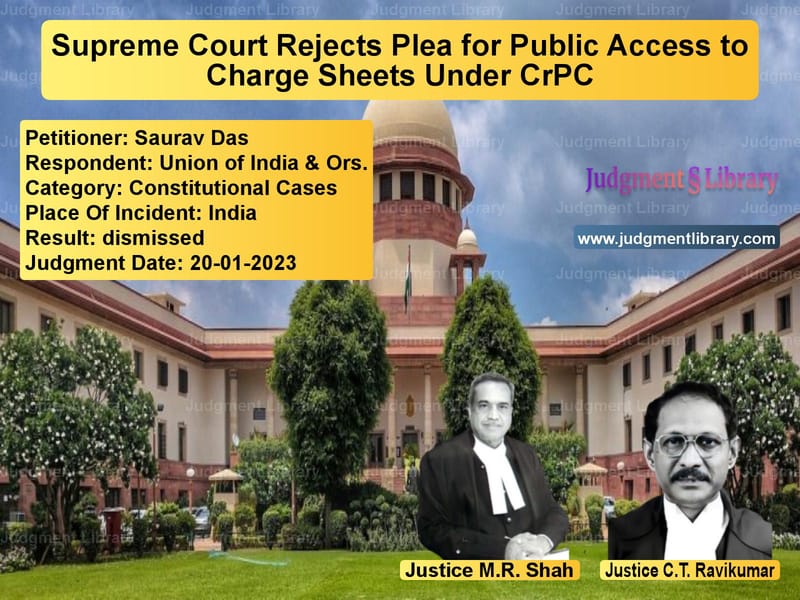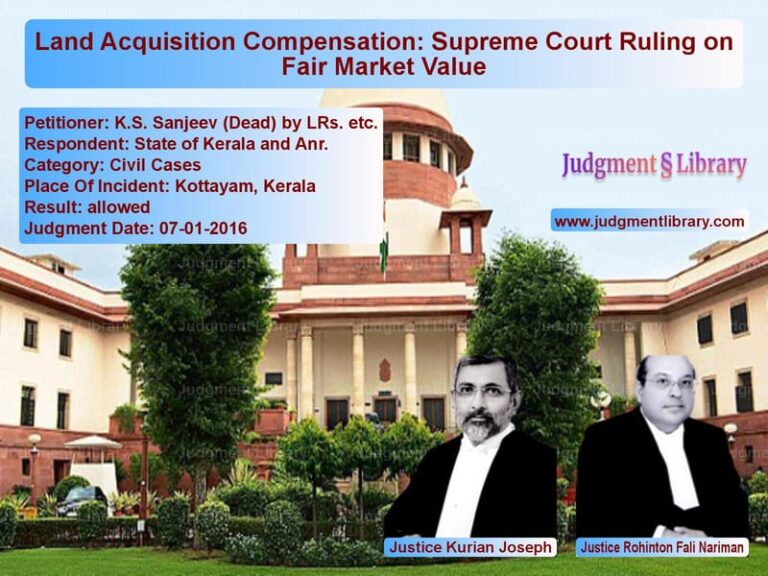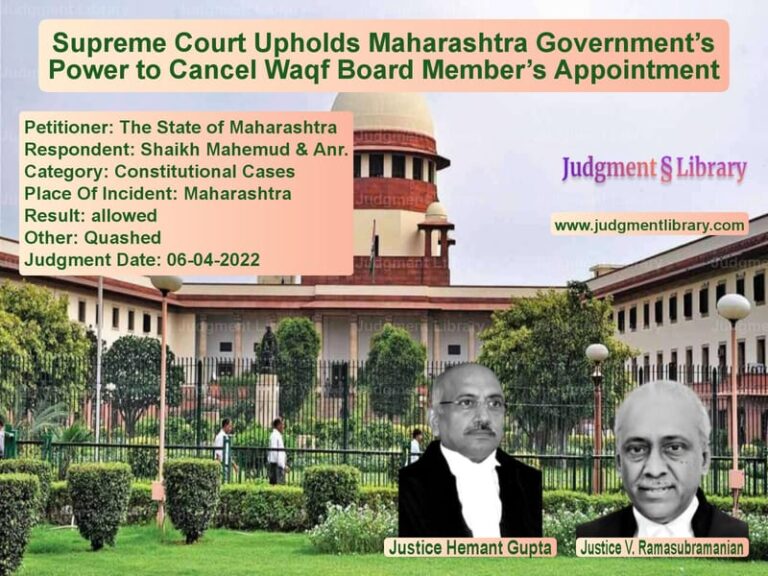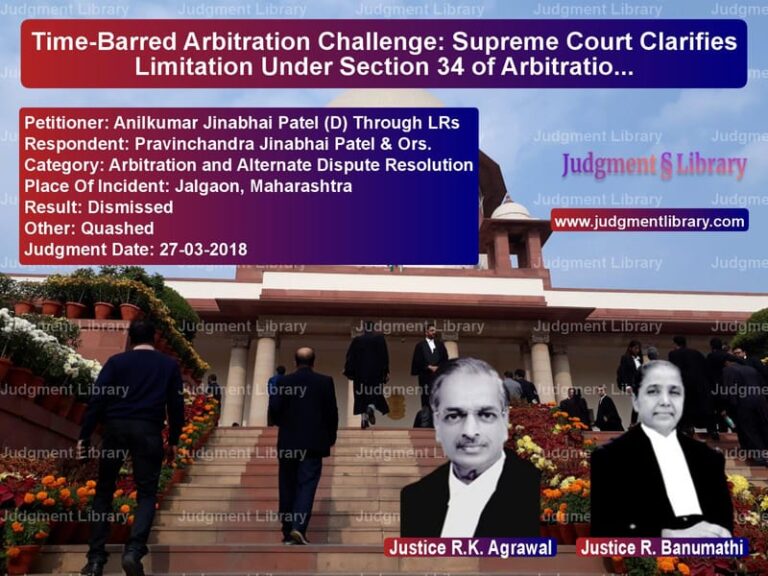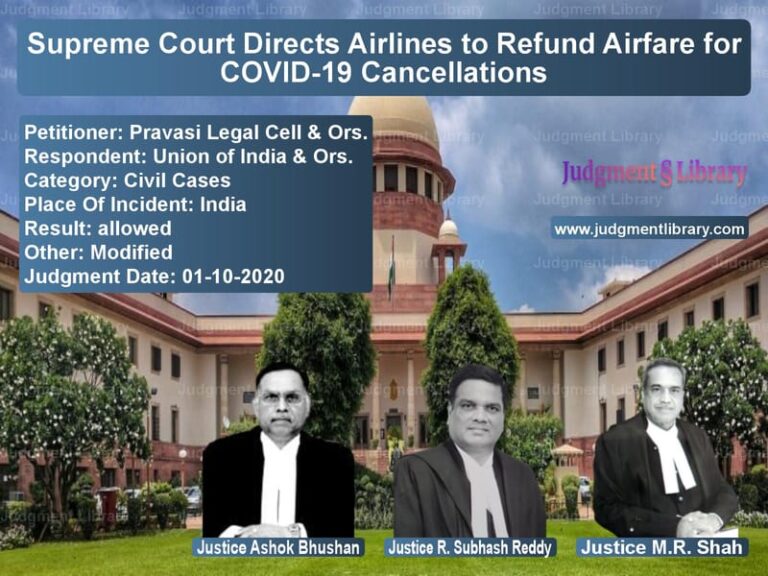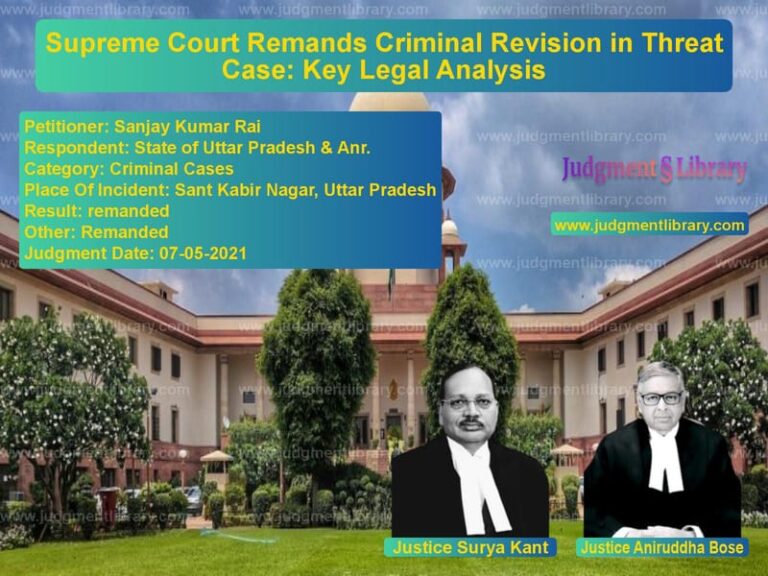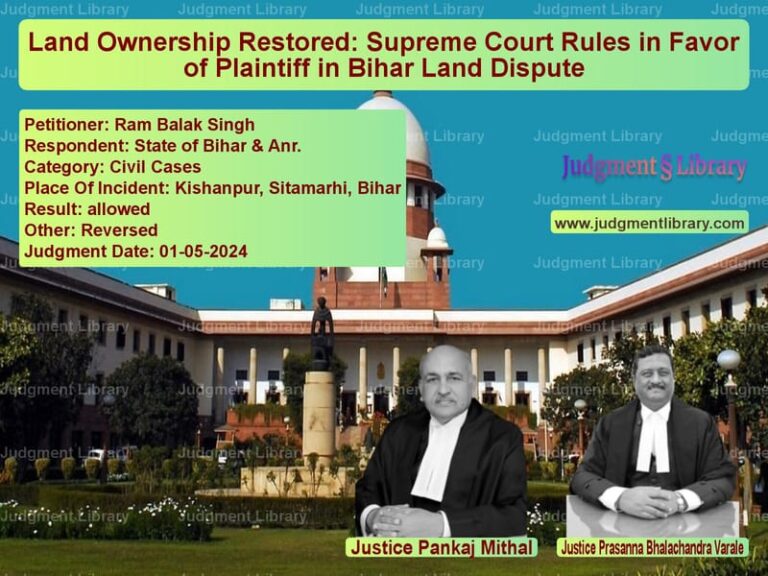Supreme Court Rejects Plea for Public Access to Charge Sheets Under CrPC
The Supreme Court of India, in the case of Saurav Das vs. Union of India & Ors., delivered a significant ruling on whether charge sheets and final reports filed under Section 173 of the Code of Criminal Procedure (CrPC) should be made publicly accessible on government websites. The petitioner, a public interest litigant, sought greater transparency in the criminal justice system, arguing that charge sheets should be as readily available as FIRs, as mandated in Youth Bar Association of India v. Union of India (2016).
Background of the Case
The petitioner, Saurav Das, approached the Supreme Court under Article 32 of the Constitution of India, seeking directions to all states to publish charge sheets and final reports on their respective websites. The petition was based on the premise that the publication of FIRs had already been mandated by the Supreme Court to ensure transparency, and the same logic should apply to charge sheets, which are filed only after due investigation.
The petitioner’s plea was built on the argument that once a charge sheet is submitted in court, it becomes a public document and should be accessible to all, thereby improving transparency and accountability in the criminal justice system. The petitioner also cited the Right to Information (RTI) Act and the Indian Evidence Act to support the contention that charge sheets should be disclosed to the public.
Key Legal Issues Considered
- Whether charge sheets filed under Section 173 of the CrPC should be made publicly accessible.
- Whether charge sheets qualify as ‘public documents’ under the Indian Evidence Act.
- Whether publishing charge sheets on government websites would violate the rights of the accused and victims.
- Whether the Right to Information (RTI) Act mandates the public disclosure of charge sheets.
Arguments of the Petitioner
The petitioner’s counsel, Prashant Bhushan, made the following arguments:
- Precedent of FIR Publication: The Supreme Court had previously directed police departments to publish FIRs online within 24 hours of their registration. A charge sheet, being the result of an investigation, should also be made publicly accessible.
- Right to Information: Section 4(2) of the RTI Act mandates proactive disclosure of information in the public interest. Charge sheets, being filed in court and forming the basis of criminal trials, should be publicly available.
- Public Document Status: The petitioner cited Sections 74 and 76 of the Indian Evidence Act, contending that charge sheets are public documents once filed in court and should therefore be open to public access.
- Enhancing Transparency: Making charge sheets publicly available would enhance transparency in the criminal justice system and allow for greater scrutiny of law enforcement agencies.
Arguments of the Respondents (Union of India & State Governments)
The government and state authorities opposed the petition on the following grounds:
- Charge Sheets Are Not Public Documents: The prosecution contended that, unlike FIRs, charge sheets are not inherently public documents and are meant only for the court and the accused.
- Risk to Accused and Victims: Publishing charge sheets could compromise the rights of both accused persons and victims, leading to harassment, undue publicity, and potential miscarriage of justice.
- Contrary to CrPC Provisions: The CrPC explicitly mandates that charge sheets be furnished only to the accused as per Section 207, and placing them in the public domain would contradict this legal provision.
- RTI Act Does Not Apply: The respondents argued that charge sheets do not fall under the proactive disclosure requirement of Section 4 of the RTI Act, as they involve sensitive and case-specific legal proceedings.
Supreme Court’s Judgment
The Supreme Court, after considering all arguments, dismissed the petition and ruled that charge sheets should not be made publicly accessible. The key findings of the judgment were:
- Charge Sheets Are Not Publicly Accessible Documents: The Court clarified that while FIRs serve as initial allegations, charge sheets are the outcome of an investigation and are meant specifically for the courts and the accused.
- Legal Provisions Do Not Support Public Disclosure: Section 207 of the CrPC mandates that charge sheets and supporting documents be provided to the accused but does not extend this provision to the general public.
- Potential Risks to Justice: The Court emphasized that publishing charge sheets could prejudice trials, infringe on the privacy of the accused and victims, and lead to undue sensationalism in criminal cases.
- RTI Act Does Not Apply: The Court held that the disclosure requirements under the RTI Act do not extend to charge sheets, as doing so would contravene procedural safeguards under the CrPC.
Conclusion
The Supreme Court’s decision in Saurav Das vs. Union of India & Ors. reinforces the principle that charge sheets are intended only for legal proceedings and not for public consumption. The ruling strikes a balance between transparency and the right to a fair trial, ensuring that sensitive legal documents remain within the judicial domain while upholding procedural fairness. This judgment sets a precedent for future cases concerning access to court documents and law enforcement records.
Petitioner Name: Saurav Das.Respondent Name: Union of India & Ors..Judgment By: Justice M.R. Shah, Justice C.T. Ravikumar.Place Of Incident: India.Judgment Date: 20-01-2023.
Don’t miss out on the full details! Download the complete judgment in PDF format below and gain valuable insights instantly!
Download Judgment: saurav-das-vs-union-of-india-&-ors-supreme-court-of-india-judgment-dated-20-01-2023.pdf
Directly Download Judgment: Directly download this Judgment
See all petitions in Fundamental Rights
See all petitions in Constitution Interpretation
See all petitions in Public Interest Litigation
See all petitions in Separation of Powers
See all petitions in Judgment by Mukeshkumar Rasikbhai Shah
See all petitions in Judgment by C.T. Ravikumar
See all petitions in dismissed
See all petitions in supreme court of India judgments January 2023
See all petitions in 2023 judgments
See all posts in Constitutional Cases Category
See all allowed petitions in Constitutional Cases Category
See all Dismissed petitions in Constitutional Cases Category
See all partially allowed petitions in Constitutional Cases Category

